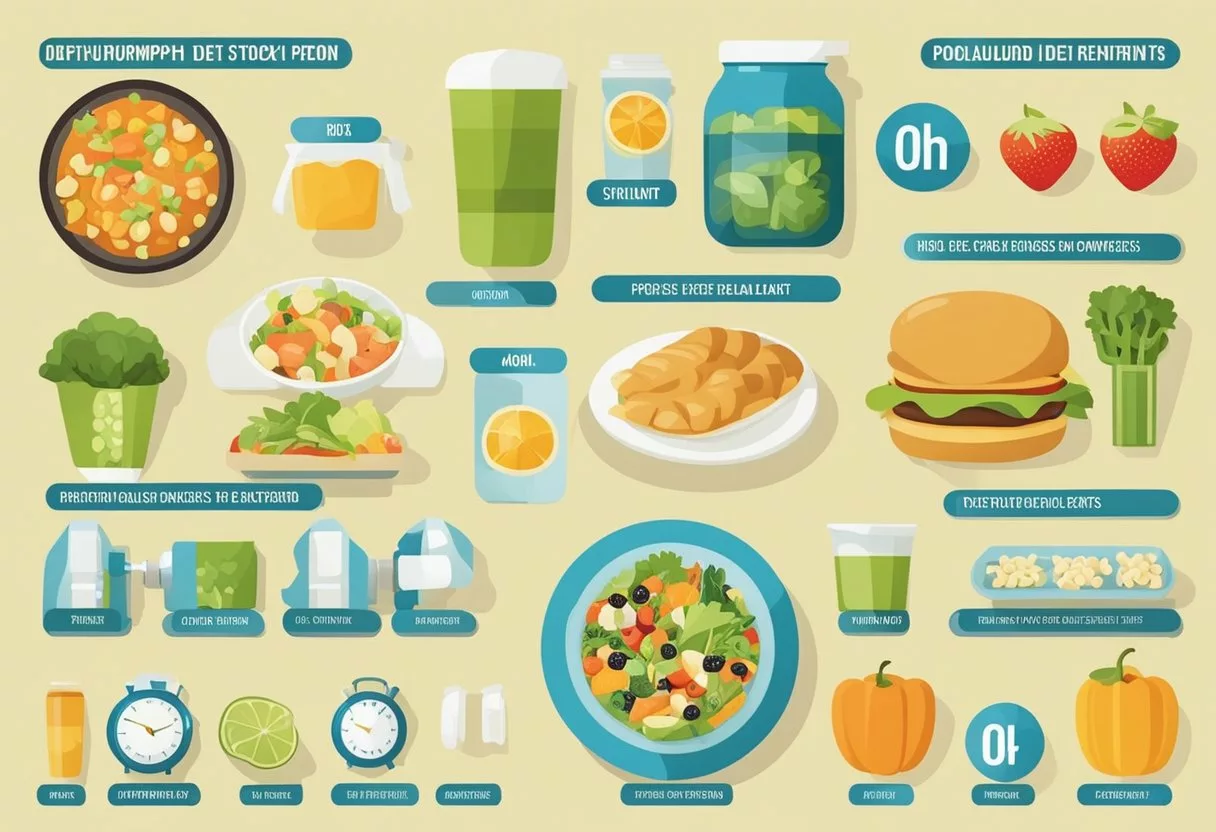Endomorphs are one of the three primary body types that are part of the somatotype classification system, along with ectomorphs and mesomorphs.
While ectomorphs tend to be lean and mesomorphs are naturally muscular, endomorphs possess a larger skeletal frame size with increased fat storage and a propensity for a slower metabolism. This body type can make weight loss more challenging, necessitating a unique approach to diet and exercise.

A diet suitable for an endomorph aims to improve metabolism and manage body weight effectively. It typically involves a specific balance of macronutrients and an emphasis on certain foods that promote satiety and energy without spiking blood sugar levels. To augment dietary efforts, physical activities tailored to endomorphs focus not only on burning calories but also on building muscle mass to improve overall metabolic rate.
Key Takeaways
- Endomorph body types have characteristics that can influence diet and exercise strategies.
- A tailored diet and workout plan can help manage weight and improve metabolism for endomorphs.
- Nutritional balance and physical activity are vital for effective weight management in endomorphs.
Understanding Endomorph Body Type

The Endomorph body type, one of the three primary somatotypes categorized by William H. Sheldon, is often associated with a fuller figure and a higher body fat percentage. Understanding this body type is crucial for tailored diet and exercise plans.
Characteristics of Endomorphs
Endomorphs are typically characterized by:
- Skeletal frame: A wider bone structure, particularly around the waist and hips.
- Body fat: They possess a higher body fat percentage and may find it challenging to lose weight.
- Somatic response: A slower metabolism that can lead to storing excess calories as fat.
Comparison With Ectomorphs and Mesomorphs
- Ectomorphs: Compared to endomorphs, ectomorphs have a lean and long body with difficulty gaining weight or muscle mass.SomatotypeMetabolismBody CompositionEndomorphSlowerHigher body fat, muscularEctomorphFasterLow body fat, less muscular
- Mesomorphs: Mesomorphs have a naturally athletic and well-defined physique, quick to gain muscle and maintain low body fat.Characteristics comparison:
- Endomorphs: Gain fat easily, struggle to lose it.
- Mesomorphs: Gain muscle easily, maintain a lean composition without significant effort.
Nutritional Foundations for Endomorphs

The nutritional strategy for endomorphs is focused on the right balance of macronutrients, understanding how their metabolism affects their body, and the critical practice of controlling portion sizes to aid in managing body composition.
Macronutrient Ratios
For endomorphs, a balance of macronutrients is essential, with a lower proportion of carbohydrates and higher portions of proteins and fats. A recommended ratio is often around 30% carbohydrates, 35% protein, and 35% fat. This balance helps regulate insulin levels and can support a steady energy release throughout the day. Complex carbohydrates rich in fiber, such as vegetables and whole grains, are preferred over simple sugars to avoid spikes in blood sugar.
The Role of Metabolism
Endomorphs typically have a slower metabolism, which means their bodies can be more efficient at storing energy, often as fat. To combat this, they may benefit from foods that can boost metabolic rate such as lean proteins, which require more energy to digest and can therefore increase the overall metabolic rate. Eating smaller, more frequent meals can also help keep their metabolism active.
Importance of Portion Control
Because endomorphs are prone to gaining weight due to their slower metabolism, portion control is crucial. Consuming more calories than the body needs can lead to increased fat storage. To avoid this, they can practice measuring food portions and be mindful of caloric intake. Using smaller plates and bowls, and checking serving sizes can help with this. Coupled with a balanced intake of proteins, fats, and carbohydrates, controlling portion size can be a powerful tool in managing an endomorph’s nutritional needs.
Recommended Foods for Endomorphs

Endomorph body types may benefit from a diet that emphasizes foods which support a healthy metabolism. These include protein-rich foods, healthy fats, and fiber-rich carbohydrates.
Protein-Rich Foods
Protein is essential for building and repairing muscles, and it can be particularly beneficial for endomorphs to support their metabolism. Lean meats such as chicken breast and turkey provide high-quality protein with minimal fat. Fish like salmon and tuna are not only great sources of protein but also contain omega-3 fatty acids which can aid in weight management. Including eggs and legumes such as lentils and chickpeas will offer a variety of proteins and other nutrients. For vegetarians, dairy and quinoa are excellent protein alternatives.
- Lean meats: turkey, chicken
- Fish: salmon, tuna
- Dairy: milk, yogurt
- Legumes: lentils, chickpeas
- Quinoa: a complete protein grain
Healthy Fats and Oils
Healthy fats are crucial for maintaining good health and can help endomorphs feel satiated. Avocados are a source of monounsaturated fats and can be a tasty addition to salads or smoothies. Nuts such as almonds and walnuts are high in healthy fats and make a convenient snack. Olive oil can be used for cooking or as a salad dressing base and has been associated with numerous health benefits.
- Nuts: almonds, walnuts
- Seeds: flaxseeds, chia seeds
- Avocado: a versatile fruit
- Olive oil: for salads and cooking
Fiber-Rich Carbohydrates
Carbohydrates that are high in fiber can help regulate blood sugar levels and are important for digestive health. Vegetables such as broccoli and carrots should form the cornerstone of the meal. Fruits and particularly berries offer fiber with a lower calorie count. Sweet potatoes are a nutritious source of carbohydrates and are rich in fiber. When choosing grains, opt for whole grains like brown rice and oatmeal which are nutrient-dense and have a lower glycemic index compared to refined grains.
- Vegetables: broccoli, carrots, leafy greens
- Fruits: apples, oranges
- Berries: strawberries, blueberries
- Sweet potatoes: nutrient-dense carb source
- Whole grains: brown rice, oatmeal
Foods to Avoid or Limit
For individuals with an endomorph body type, certain foods can impede weight management and overall health. Specifically, high-sugar foods, refined carbohydrates, as well as processed and high-fat foods are typically recommended to be limited or avoided.

High-Sugar Foods
Foods high in sugar, especially added sugars, can contribute to weight gain and disrupt blood sugar levels. Endomorphs are advised to limit or avoid:
- Sugary snacks: candies, cookies, and sweet pastries.
- Sweetened beverages: soda, fruit juices, and specialty coffees.
Refined Carbohydrates
These types of carbohydrates are stripped of their fiber and nutrients, resulting in a quicker spike in blood sugar levels upon consumption. Notable refined carbohydrates to avoid include:
- White bread: often lacks the beneficial nutrients found in whole-grain bread.
- Pasta and pastries: Choose versions made from whole grains instead.
Processed and High-Fat Foods
Processed foods generally contain less-nutritious forms of fats and can be high in calories. Endomorphs should limit:
- Processed snacks and meals: These often contain saturated fats and added sugars.
- Fried food: Typically high in calories and unhealthy fats.
By focusing on whole, nutrient-dense foods and limiting the intake of these items, endomorphs can better support their health objectives.
Exercise and Physical Activity Advice
For individuals with an endomorph body type, a structured exercise routine emphasizing a mix of cardiovascular, strength, and high-intensity exercises is crucial to improving fitness and facilitating weight management. The focus should be on regular physical activity that boosts metabolism and builds muscle mass.
Cardiovascular Exercises
Cardiovascular exercises should be an integral part of an endomorph’s fitness routine, aiming to enhance heart health and burn fat. Activities like walking, jogging, cycling, or swimming can be highly effective. These should be performed for at least 30 minutes, 3-5 times a week to see a significant impact on endurance and weight control.
- Monday/Wednesday/Friday: 30-minute brisk walk or jog.
- Sunday: 45-minute swim or cycle session.
Strength and Resistance Training
Strength and resistance training are essential for endomorphs to build and maintain muscle mass, which in turn accelerates metabolism. Incorporating weight training with free weights or machines will help in developing a leaner physique. Compound exercises, such as squats and deadlifts, are particularly beneficial as they target multiple muscle groups.
- Sets: 3-5 | Reps: 8-12 | Rest: 20-60 seconds
Exercises:
- Squats
- Overhead Press
- Bench Press
- Bent-Over Rows
High-Intensity Interval Training (HIIT)
High-Intensity Interval Training (HIIT), involving short bursts of intense activity followed by a rest or low-intensity period, is highly effective for fat loss. A HIIT exercise routine improves cardiovascular fitness and is more time-efficient, making it suitable for those with limited schedules.
Routine:
- 30 seconds of sprinting
- 1 minute of walking (rest)
- Repeat for 15-20 minutes.
Weight Management Strategies

Weight management for endomorphs demands a strategic approach, focusing on specific aspects such as caloric balance and the hormonal effects on weight. A meticulous approach to dieting is paramount for sustainable weight loss.
Understanding Caloric Balance
For endomorphs, maintaining a caloric deficit is crucial for fat loss. It involves consuming fewer calories than the body expends. A balance of 30 percent carbohydrates, 35 percent protein, and 35 percent fat can be effective, as highlighted by Healthline. This distribution supports satiety and energy needs while promoting a gradual reduction in body weight. Portion control plays a significant role in managing calorie consumption — proper portion sizes help prevent overeating and can contribute to consistent weight loss.
The Role of Hormones in Weight Gain
Hormonal fluctuations greatly influence weight, particularly in endomorphs. Elevated levels of estrogen can promote fat storage, especially in the lower body. Conversely, testosterone can facilitate lean muscle gain and aide in fat loss. Managing these hormones through diet and lifestyle choices is paramount; for instance, incorporating foods that support hormonal balance can aid in managing body composition.
Sustainable Dieting Tips
Sustainable dieting for an endomorph involves more than just short-term changes; it requires life-long adjustments to eating habits. The National Academy of Sports Medicine underscores the need for a diet rich in lean proteins, complex carbohydrates, and healthy fats. To optimize metabolism and support muscle development:
- Include high-fiber foods to enhance satiety and digestion.
- Implement regular, nutrient-dense meals to avoid extreme hunger that can lead to overeating.
- Use tools like food diaries or apps to monitor intake and ensure accountability.
Specialized Diet Considerations

Endomorphs may benefit from specific dietary frameworks that cater to their propensity for efficient fat storage. These specialized diets focus on macronutrient manipulation and the quality of the food sources to potentially enhance metabolism and support fat loss.
Low-Carb and Ketogenic Diets
For endomorphs, a low-carb diet can help mitigate the rapid storage of fat by reducing insulin spikes. A typical keto diet further restricts carbohydrate intake, often to less than 50 grams per day, encouraging the body to enter a state of ketosis where it burns fat for energy. This approach might be beneficial as it shifts the dominant energy source from carbohydrates to fats, possibly improving body composition.
- Ketogenic Diet Breakdown:
- Carbohydrates: 5-10%
- Proteins: 20-30%
- Fats: 60-75%
Paleo Diet Perspective
The Paleo diet emphasizes consuming whole foods that would have been available to our Paleolithic ancestors. For endomorphs, this diet can provide a balanced approach to eating a healthy diet rich in fruits, vegetables, lean meats, and healthy fats, while naturally lower in processed foods and simple carbohydrates. It’s posited this natural, less refined diet helps maintain stable blood sugar levels and reduce fat storage.
- Core Components of Paleo:
- Fruits and Vegetables
- Lean Proteins
- Nuts and Seeds
- Healthy Fats
The emphasis is on avoiding processed foods and sugars, which aligns well with the endomorph’s need for controlled insulin response.
Incorporating Supplementation
Supplementation can be a strategic addition for endomorphs navigating a diet tailored to their needs. They might consider supplements like omega-3 fatty acids to support overall health and protein powders to assist in lean muscle maintenance. Fiber supplements may also aid in satiety and glycemic control, important aspects in a healthy diet for endomorphs.
- Common Supplements:
- Omega-3s: For heart health and inflammation control
- Protein Powders: To support muscle repair and growth
- Fiber: To enhance satiety and support digestive health
The choice of supplements should be informed by dietary restrictions and personal goals within a healthy and balanced dietary framework.
Lifestyle and Behavioral Factors

Successful management of an endomorph diet goes beyond mere food choices; it equally involves adapting one’s lifestyle and behavior to create sustainable habits. Key aspects include meticulous meal planning, developing healthy eating patterns, and ensuring coping strategies for stress while prioritizing sleep quality.
Meal Planning and Preparation
Effective meal prep for endomorphs involves selecting a balance of macronutrients that supports their body type’s specific needs. They typically benefit from meals that emphasize high-protein, high-fiber, and healthy fats while being lower in carbohydrates. This can include incorporating lean meats, leafy greens, and foods like quinoa and avocado. It is recommended to prepare meals in advance to prevent impulsive eating decisions that may not align with their dietary goals.
Eating Habits and Patterns
For endomorphs, consistent eating habits can significantly influence their ability to manage weight and overall health. They may find it advantageous to eat smaller, more frequent meals to keep their metabolism active. Integrating fibrous vegetables and wholesome proteins in meals can help manage hunger levels and reduce the temptation of high-sugar snacks. Mindful eating practices, such as chewing slowly and without distractions, can aid in better digestion and satiety.
Stress Management and Sleep Quality
Stress management is a vital component that can impact an endomorph’s dietary success. High levels of stress can lead to emotional eating and selection of comfort foods that are often calorie-dense and nutrient-poor. Incorporating techniques such as meditation, deep-breathing exercises, or yoga can help in mitigating stress. Moreover, prioritizing sleep quality is imperative; a lack of sleep can disrupt hormone balance and potentially lead to weight gain. Adults should aim for 7-9 hours of quality sleep per night to maintain optimal health and weight management.
Final Thoughts on Endomorph Diets

The endomorph diet aims to support individuals with an endomorph body type in attaining and maintaining a healthy lifestyle. Tailored nutrition is pivotal — focusing on whole foods, lean proteins, and complex carbohydrates, while incorporating healthy fats. A balanced approach, rather than restrictive eating, is encouraged for long-term health.
They benefit from a diet rich in:
- Proteins: such as chicken, fish, and legumes.
- Complex carbohydrates: including quinoa and sweet potatoes.
- Healthy fats: like those found in avocados and nuts.
Portion control and frequent meals play a crucial role in managing caloric intake without foregoing essential nutrients. The right distribution of macronutrients — keeping protein intake high and moderating fats and carbohydrates — assists in optimizing metabolism and fat loss.
Hybrid body types, reflecting a mix of endomorphic characteristics with other body types, may need refined approaches. Tailoring diet plans to respond to these unique combinations can further enhance success.
In summary, picking a diet that augments an endomorph’s metabolic challenges and coupling it with regular exercise can lead to sustainable weight management and overall health enhancement. It’s not just diet adjustment, but a lifestyle adaptation that tickets one towards vitality and well-being.
Frequently Asked Questions

Endomorphs often require tailored dietary strategies to balance their macronutrient intake and manage their weight effectively. This section addresses common inquiries related to optimizing an endomorph’s diet.
What foods should endomorphs avoid to maintain a healthy diet?
Endomorphs should generally avoid foods that are high in refined carbohydrates and sugars, which can lead to increased fat storage. They are advised to limit their consumption of sugary snacks, white bread, pasta, and other high-glycemic index foods.
How can endomorphs effectively lose weight through dietary changes?
For endomorphs aiming to lose weight, a diet lower in carbohydrates and higher in protein and fats can be beneficial. It’s essential to create a caloric deficit by consuming fewer calories and focusing on whole foods that are nutrient-dense but not calorie-dense.
What are the ideal breakfast options for endomorphs focusing on weight management?
Ideal breakfast options for endomorphs should include lean proteins and fiber-rich vegetables, such as scrambled eggs with spinach and tomatoes. These choices help maintain satiety and balance blood sugar levels throughout the morning.
Are eggs suitable for endomorphs, and if so, how should they be incorporated into the diet?
Eggs are highly suitable for endomorphs due to their high protein content and versatility. They can be boiled, scrambled, or poached and paired with vegetables to create a balanced meal that supports muscle maintenance and satiety.
How can an endomorph female plan her diet and workout for optimal health?
An endomorph female can plan her diet by focusing on a higher intake of lean proteins, healthy fats, and low-glycemic carbohydrates, combined with a consistent exercise routine that includes both cardio and strength training to maximize calorie burn and muscle toning.
What are the components of an effective meal plan for endomorphs looking to lose weight?
An effective meal plan for endomorphs should include a balanced distribution of macronutrients, with a suggestion of [40% protein, 40% fat, and 20% carbohydrates](https://www.athleticinsight.com/diet/endomorph). Portion control, frequent smaller meals, and a focus on whole foods are key components to manage calorie intake and metabolism.
How does the metabolic confusion diet work for endomorph body types?
The metabolic confusion diet involves alternating between high-carbohydrate and low-carbohydrate days. This prevents the body from adapting to a consistent calorie deficit. While this approach may work for some endomorphs, it is important to consult with a healthcare professional before making significant changes to the diet. Endomorphs may benefit from a more sustainable approach that focuses on reducing calorie intake and increasing physical activity over time.
